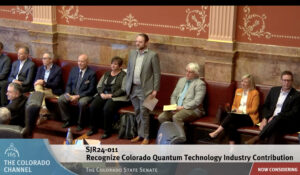As legislators try to squeeze new programs into a tight budget hole this year, state economic-development leaders are working similarly to leverage limited resources to garner federal funds that can generate more than a $1 billion impact for Colorado’s advanced industries.
The efforts, spearheaded by Gov. Jared Polis and the Colorado Office of Economic Development and International Trade, are focused on the CHIPS and Science Act, a 2022 federal law aimed at boosting the country’s semiconductor and tech industries. Colorado has set aside nearly $150 million to be spent over the next five years to try to grow the state’s quantum and semiconductor-manufacturing sectors, but that money pales to what it could bring back from the federal government.
The primary new spending allotted in next year’s budget is $74 million in incentives that can only be spent if the state wins U.S. Economic Development Administration designation as a Regional Technology and Innovation Hub focused on quantum information science. In that case, it can offer up to $44 million in refundable income-tax credits to firms building a shared research facility that can commercialize quantum learnings and $30 million in loan-loss funding for banks and lenders willing to invest in early-stage quantum companies.
But that total is additive to a five-year, $75 million allocation legislators approved in 2023 for new incentives aimed specifically at the semiconductor and advanced manufacturing industries, aiming to allow recipients to use that money to bolster bids for federal aid. Several companies have gotten the new incentives so far, and one, Microchip Industries, also received a $90 million grant from the U.S. Department of Commerce in January to build a 50-acre campus expansion in Colorado Springs that will create 400 jobs.
A coordinated effort to leverage federal funds
OEDIT Executive Director Eve Lieberman said the state is creating the new programs to take advantage of these “once-in-a-generation opportunities” presented by the federal government. While the $150 million Polis has been willing to invest is not chump change, it still is small compared to potential benefits of more than 10,000 jobs and the chance to be the nation’s leading quantum and advanced-industry ecosystem, which will create growth opportunities for decades.

Eve Lieberman is executive director of the Colorado Office of Economic Development and International Trade.
“We really want to be able to leverage these federal opportunities,” Lieberman said in an interview. “We’re really looking at it in a holistic lens to make sure we are demonstrating significant state support in order to capitalize.”
House Bill 1325, sponsored by Democratic Rep. Alex Valdez of Denver and Republican Rep. Matt Soper of Delta, exemplifies the way the state is pursuing these timely pools of potential federal funding.
The bill follows the EDA’s October selection of Colorado as one of two quantum tech hub designees, along with the Chicago area, competing against each other for Phase II hub recognition, which brings with it $70 million in funding to grow its ecosystem. That money, in turn, could generate 10,000 jobs and $1 billion in economic impact, state officials argue, as start-up and growing companies would be more likely to locate in Colorado to take advantage of its resources and earned reputation as the U.S. center of the sector.
A blueprint for cornering the quantum sector
Its $44 million in refundable state income tax credits is likely to go just to one or two users who will invest in building a shared academic research center and incubator housing multiple start-up quantum companies seeking to bring products to market. Massimo Ruzzene, University of Boulder vice chancellor for research and innovation, said his institution is working with Colorado State University, Colorado School of Mines and the Elevate Quantum consortium to establish such a center.
Similarly, the $30 million in refundable income-tax credits that benefit applicant banks or lenders who grant debt to start-up companies that otherwise may not qualify for such loans is likely only going to be used by a couple of lenders at most, said Jeff Kraft, OEDIT deputy director. Applicants would seek the tax-credit certificate as a financial backstop even before loans have incurred any losses and then apply again later for registered loan loss certificates of as much as 15% of the size of the loan.

Corban Tillemann-Dick stands to be identified in March as the Colorado Senate passed a resolution supporting the quantum sector.
Quantum leaders told the House finance committee during a March 18 hearing that even though the use of such tax credits may not be widespread, their existence could be game-changing for the sector. Corban Tillemann-Dick, owner of MayBell Quantum Industries of Denver, said he expects the loan-loss guarantee could help to create 10,000 jobs alone at his firm that builds dilution refrigerators to cool chips inside the quantum computers to the temperatures needed for them to work at tremendous speeds.
“This bill is transformative,” Tillemann-Dick said. “It also is a powerful statement that greatly improves our chances of winning federal funding.”
Potential to leverage billions of dollars
In addition to HB 1325 — which passed the House 48-16 Tuesday with both bipartisan support and bipartisan opposition and now awaits its first hearing in the Senate Finance Committee — the House and Senate in March passed a joint resolution calling for the federal government to award Colorado phase II quantum hub status. Sen. Jeff Bridges, the Greenwood Village Democrat cosponsoring both the bill and resolution, noted that the scale-up of the quantum sector would create jobs not just for highly educated engineers but for thousands of individuals who could work in the manufacturing of industry products.
And while Boulder may have the early reputation as the center of the state’s quantum sector — four University of Colorado professors have won Nobel Prizes for their work in quantum — it and the semiconductor industry can have statewide impacts. Soper, who also sponsored last year’s semiconductor-incentives bill, told a Grand Junction Chamber of Commerce event last May that the Grand Valley could be a prime manufacturing area if the state can leverage the $75 million to pull down billions of dollars in federal incentives.
Colorado isn’t likely to garner facilities like a $40 billion factory that Taiwan Semiconductor Manufacturing Company is building in Phoenix, but it can attract or grow facilities like Microchip’s that can supply semiconductor components, Lieberman said. And that’s just one part of the larger Colorado strategy to draw down federal money to grow high-paying industries that also can benefit underserved communities, she said.
“It could definitely bring in expansions and headquarters like you see for the aerospace industry,” she added. “You could see that more jobs are centered here for quantum than in any other state.”
